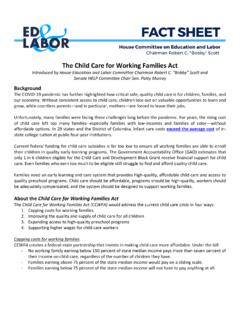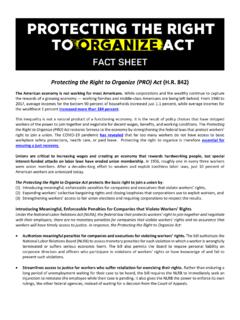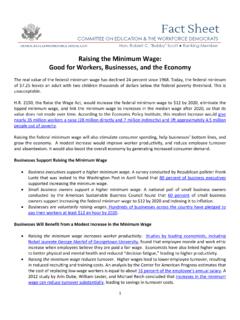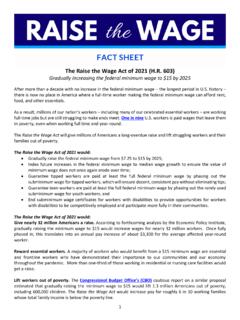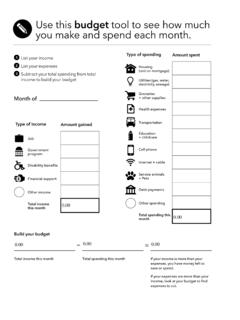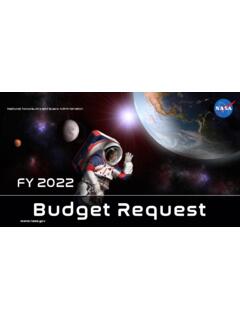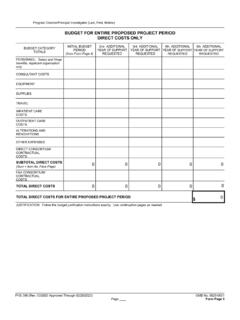Transcription of FY21 Budget Reconciliation Bill - United States House of ...
1 FY21 Budget Reconciliation Bill Urgent COVID-19 Relief for Students, Educators, Workers, and Families The FY21 Budget Reconciliation bill fulfills the promise of President Biden's American Rescue Plan. The Education and Labor Committee one of the 12 Committees tasked with contributing to the Reconciliation package is responsible for key programs and initiatives to help students get back to the classroom safely, support workers, and provide aid to struggling people and families. Securing Urgent Relief for Students, Schools, Institutions, and Child Care The Reconciliation bill invests in helping K-12 schools safely reopen and address lost time in the classroom.
2 The bill: Provides nearly $130 billion to help schools take the steps recommended by the Centers for Disease Control and Prevention to ensure students and educators can return to the classroom safely. o This includes repairing ventilation systems, reducing class sizes and implementing social distancing guidelines, purchasing personal protective equipment, and hiring support staff to care for students'. health and well-being. o Schools must reserve at least 20 percent of the funding they receive to address learning loss. The Reconciliation bill provides funding to support institutions of higher education and help their students cope with the financial strain caused by COVID-19.
3 The bill: Includes nearly $40 billion for institutions of higher education that are struggling to make up for lost revenue following campus closures. o Institutions must dedicate at least half of the funding for emergency financial aid grants to prevent hunger, homelessness, and other hardships that students are facing as a result of the pandemic. The Reconciliation bill rescues the child care system from the brink of collapse and makes child care more affordable for families. The bill: Stabilizes the child care system by investing $39 billion in child care providers through the Child Care and Development Block Grant Program.
4 Child care providers receiving funds must provide financial relief for families, to the extent possible, and prioritize such relief for families struggling to cover tuition. Provides $1 billion for the Head Start program to ensure families can continue to access quality early learning opportunities. 1. Protecting the Health of Families and Communities The Reconciliation bill expands access to affordable health care during the pandemic for workers and families who lost job-based coverage. The bill: Provides COBRA subsidies to ensure workers who have been laid-off or subject to reduced hours can access affordable health coverage.
5 This provision would allow workers and their families to keep their doctors, maintain continuity of care, and avoid restarting their annual deductibles and out-of-pocket limits mid-year. For workers not eligible for COBRA, other provisions improve subsidies for health coverage through the ACA. Marketplaces, helping small businesses, self-employed, and gig economy workers impacted by the pandemic. The Reconciliation bill addresses the tragic surge in child hunger by preserving and expanding critical food assistance for children and families. The bill: Maintains and expands the Pandemic-EBT (P-EBT) program by investing more than $5 billion in P-EBT so that low-income families have access to food assistance during both the school year and summer months.
6 Includes more than $800 million for the WIC program, which supports low-income women and infants, and boosts the value of WIC Cash Value Vouchers (CVV) for vulnerable mothers and children. Temporarily expands the age of eligibility for the Child and Adult Care Food Program (CACFP) at emergency homeless shelters, to ensure more young adults can access needed nutrition support. The Reconciliation bill includes critical support to protect the health and well-being of children, families, and older Americans, and also includes support for survivors of domestic and gender-based violence. The bill: Helps prevent and respond to child abuse and neglect by providing $350 million for the Child Abuse Prevention and Treatment Act (CAPTA).
7 Strengthens our response to domestic and gender-based violence by providing $450 million in support for survivors, including funding for rape crisis centers and programs to support survivors of family violence under the Family Violence Prevention and Services Act (FVPSA). Helps families cover the costs of home heating and cooling by providing $ billion for the Low Income Home Energy Assistance Program (LIHEAP). Invests more than $ billion to strengthen critical programs for older adults including nutrition assistance, vaccination support, and caregiver support under the Older Americans Act (OAA) and the Elder Justice Act.
8 Supporting America's Workers The Reconciliation bill increases wages for at least 27 million American workers. The bill: Gradually increases the minimum wage to $15 an hour by 2025 and guarantees that tipped workers, youth workers, workers with disabilities are paid the full federal minimum wage. The Reconciliation bill strengthens workplace protections for essential workers. The bill: Provides the Department of Labor $150 million to implement COVID 19 worker protection programs, including $75 million specifically for the Occupational Safety and Health Administration. 2. The Reconciliation bill helps ensure COVID-19 workers' compensation coverage for frontline maritime and federal workers.
9 The bill: Establishes a presumption that COVID-19 is work-related and authorizes eligibility for medical benefits, lost wages, and survivor benefits for longshore and shipyard workers, under the Longshore and Harbor Workers' Compensation Act (LHWCA), as well as federal and postal workers, under the Federal Employees'. Compensation Act (FECA). 3.
